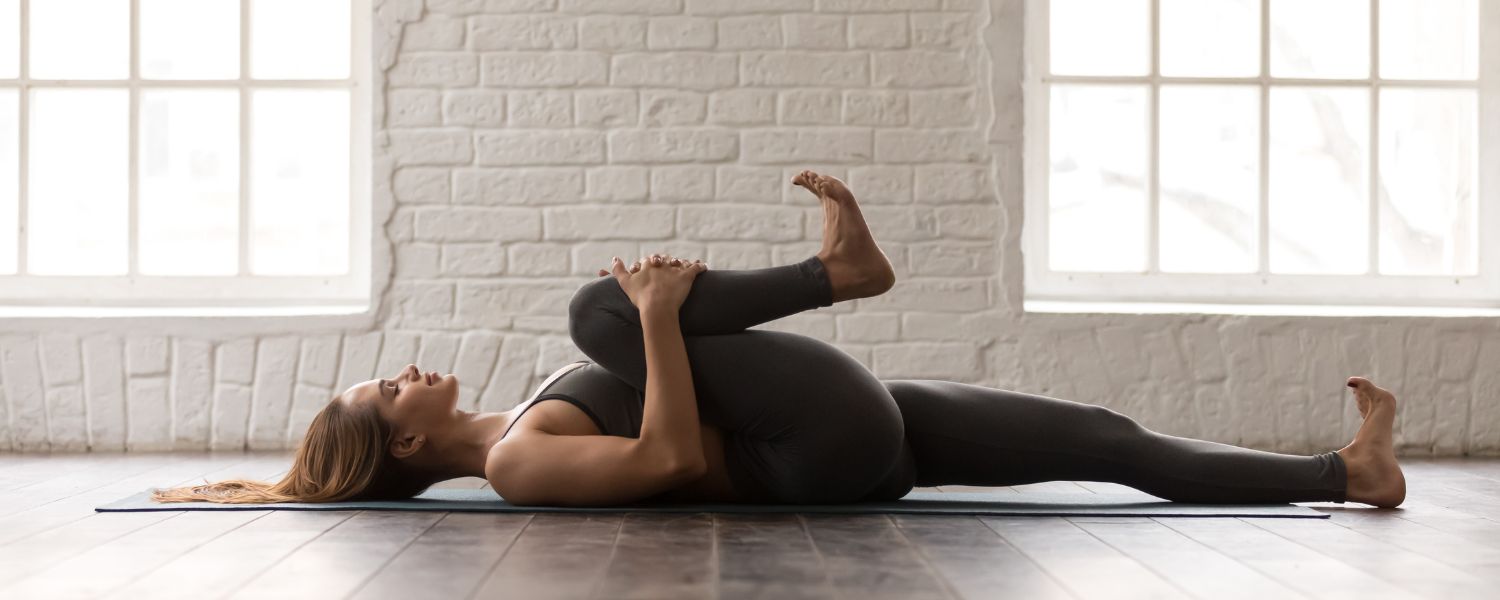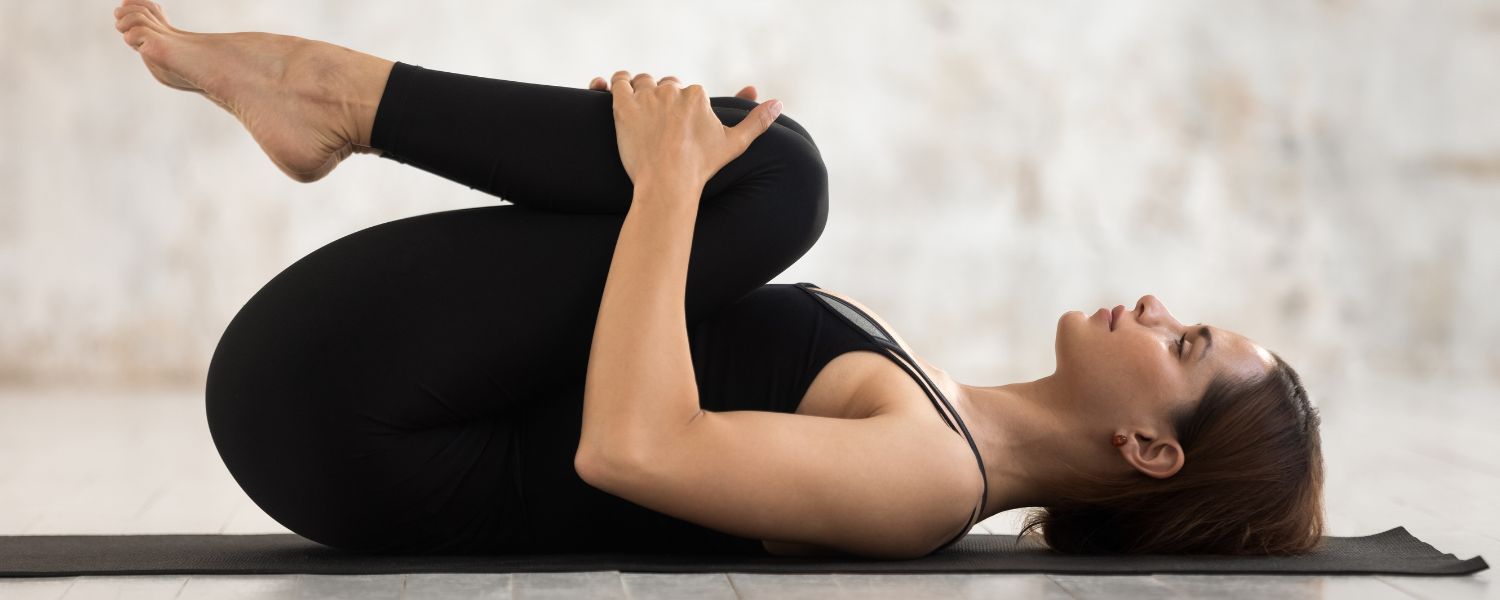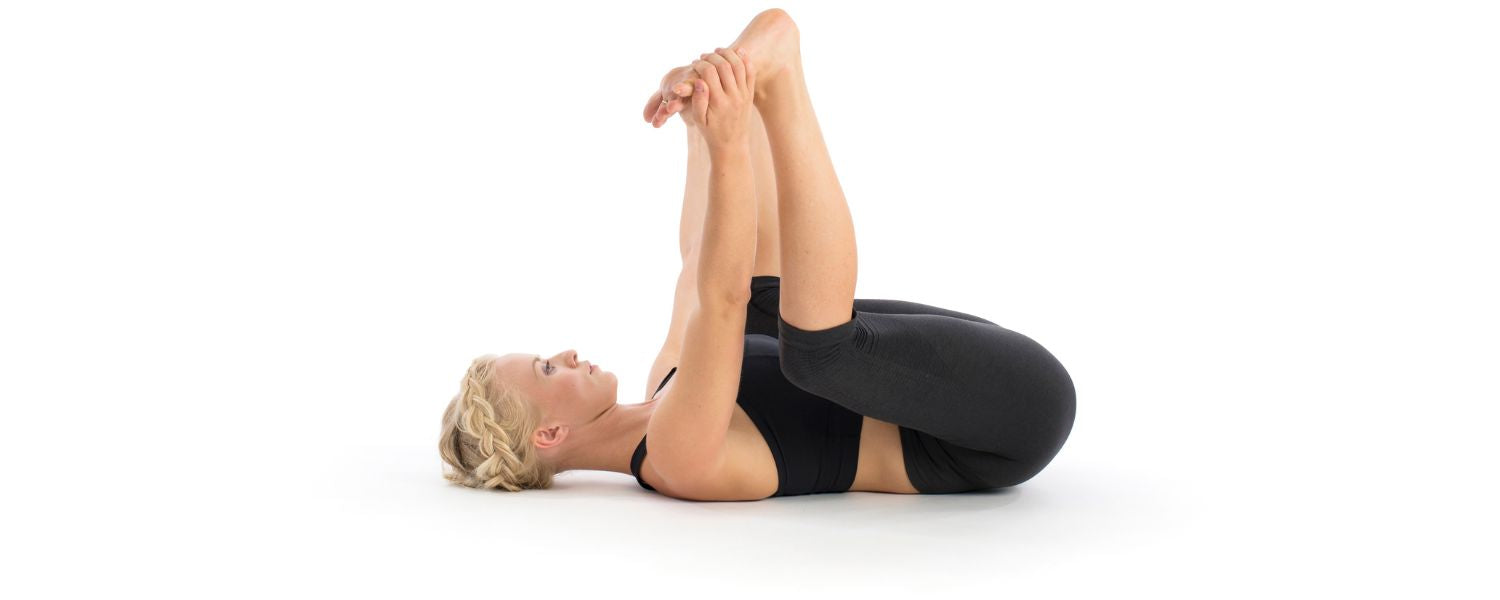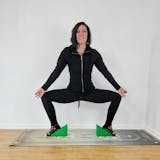The Wind-Relieving Pose (or Knees-to-Chest Pose), also known as Pawanmuktasana in Sanskrit, as the name suggests, is a yoga posture to provide relief from digestive issues, releases abdominal gas, and promotes relaxation in the lower back and hips.
The literal meaning of Wind Relieving Pose in Sanskrit is
- "Pavana" — "wind" or "air"
- "Mukta" —"release" or "freedom"
- "Asana" — "pose"
This Wind-Relieving Pose involves gently pulling one knee at a time toward the chest while lying on your back. It is a beginner-friendly pose and can be performed at any time of the day, especially after a meal.
The contents of this blog will show you how to practice the Wind-Relieving Pose, discuss its advantages, suggest some tweaks, and provide advice on how to yield more benefits.
How to perform the Wind-Relieving Pose?
Here are the Wind-Relieving Pose steps to get you improved digestion:
- Your arms should be by your sides as you lay flat on your back.
- Your right knee should be bent and brought up toward your chest as you exhale.
- Gently nudge your right knee toward your chest by enclosing it in your hands.
- Keep your left leg extended and relaxed on the ground.
- Focus on relaxing your lower back and hips while you hold the position for a few deep breaths.
- Release your right leg and return it to the ground.
- Repetition of the gas-relief Wind-Relieving Pose on your left side with your left leg up to your chest. Hold the position for a few breaths.
- Release your left leg and return it to the ground.
- Your hands should be around your knees as you bring them both to your chest.
- Gently rock back and forth, massaging your lower back and hips.
- Release the Wind-Relieving Pose and return to a flat position on your back.
Wind-Relieving Pose For Kids

The Wind Relieving pose is super beneficial for kids to relieve gas and bloating in the digestive system and improve overall digestion. To perform the pose, kids can lie on their back with their legs extended and bring one knee towards their chest, holding it with both hands.
They can gently rock from side to side to massage the lower back and hips. Then, they can release the leg and repeat with the other leg.
Kids can also try bringing both knees towards their chest for a deeper stretch. Kids should be encouraged to listen to their body and go only as far as feels comfortable.
Tips for Performing Wind-Relieving Pose
To get the most out of the Wind-Relieving Pose, consider the following suggestions:
1. Focus on your breathing:
Take deep, slow breaths as you hold the Wind-Relieving Pose, allowing your body to relax and release tension.
2. Use props if needed:
If you have trouble holding onto your knee, you can use a strap or towel to loop around your foot and hold onto that instead.
3. Keep your neck and shoulders relaxed:
Avoid tensing your neck or shoulders during the Wind-Relieving Pose. Instead, focus on relaxing those areas and allowing your breath to guide your movements.
4. Practice regularly:
Regular practice of the Wind-Relieving Pose improves digestion, relieves gas and bloating, and promotes relaxation in the lower back and hips.
5. Listen to your body:
If you experience discomfort or pain, release the Wind-Relieving Pose and rest for a few moments before trying again. Don't push yourself too hard.
Benefits of Wind-Relieving Pose In Yoga
Some Wind-Relieving Pose benefits include:
1. Aids Digestion:

Wind-Relieving Pose helps to stimulate the digestive system by massaging the abdominal organs, which relieves constipation, bloating, and gas.
2. Relieves Lower Back Pain:
The practice of Wind-Relieving Pose relieves tension and stiffness in the lower back muscles and is especially beneficial for people who sit for long periods.
3. Calms the Mind:

Wind-Relieving Pose is a gentle, calming pose that reduces stress and anxiety by promoting deep breathing and relaxation.
4. Improves Blood Circulation:

This pose improves blood circulation in the lower back, hips, and legs to relieve tension and reduce inflammation.
5. Strengthens Abdominal Muscles:

Wind-Relieving Pose practice strengthens the abdominal muscles, which improve posture and support the lower back.
Modifications for performing The Wind-Relieving Pose
To modify Wind-Relieving Pose, you can make some adjustments to the position or use props to make the pose more accessible. Here are some examples:
1. Use Props:

You can use props such as a folded blanket, yoga blocks, or a bolster to support your body in the pose. You may use a yoga block under your knees to help you raise your knees closer to your chest, or you could place a folded blanket under your head or lower back for support.
2. Bend Your Knees:

If you find it difficult to straighten your legs, you can bend your knees slightly. This will make it easier to hug your knees into your chest and keep your back on the ground.
3. Take it Slow:

If it's difficult for you to hold the Wind-Relieving Pose for a long time, try holding it for a few breaths, releasing, and repeating. Gradually increase the duration of the Wind-Relieving Pose as you become more comfortable.
4. Half Wind-Relieving Pose:

If you find bringing both knees towards your chest challenging, you can start with one knee at a time. One knee should be bent and brought close to your chest. After holding for a few breaths, relax and swap sides.
Variations For Performing Kid-Friendly Wind-Relieving Pose
The Wind-Relieving Pose yoga posture can be modified for kids, too, to make it more fun and engaging. Here are some variations:
1. Happy Baby Pose:

This is a variation of the Wind-Relieving Pose that kids often love. To perform the pose, kids can lie on their backs and bend their knees towards their chests. They can grab the outsides of their feet with their hands and gently rock from side to side.
2. Bicycle Legs:

Kids can lie on their backs and bring their knees towards their chest to perform the Wind-Relieving Pose. They can then alternate straightening one leg and bending the other as if pedaling a bicycle.
3. Knees to Chest:

This is a simpler variation of the Wind-Relieving Pose that kids can easily perform. To perform the pose, kids can lie on their backs and bring both knees towards their chest, hugging them with their arms.
4. Rock and Roll:

This is a playful variation of Wind-Relieving Pose that kids often enjoy. To perform the pose, kids can lie on their backs and bring their knees toward their chests. They can then rock forward and backward, using their momentum to roll up to a seated position.
These variations can help make Wind-Relieving Pose more fun and engaging for kids, but it's always best to perform yoga poses with caution and awareness to avoid injury.
Cautions While Performing Wind-Relieving Pose
Make sure to follow these cautions while performing Wind Relieving Pose:
1. Avoid straining your neck:

It's important to keep your neck relaxed and avoid straining it while performing the Wind-Relieving Pose. If needed, you can do this by resting your head on the floor or a cushion.
2. Avoid overstretching:

It's important not to push yourself too far into the Wind-Relieving Pose, especially if you're a beginner.
3. Keep your knees aligned:

While performing the Wind-Relieving Pose,keep your knees aligned with your hips. This can help prevent strain and injury to the hips and lower back.
4. Breathe deeply:

Breathing deeply and steadily while performing Wind Relieving Pose is important.
5. Don't force the pose:

If you experience any pain or discomfort while performing the Wind-Relieving Pose, it's important to stop and rest. Don't force the pose beyond your limits.
Remember, if you have health concerns or injuries, it's always best to consult a qualified yoga teacher or healthcare professional before practicing yoga.
Practice To Reap Results
Wind-Relieving Pose Is a beneficial yoga posture that can help to improve digestion, reduce stress, relieve lower back pain, and strengthen the abdominal muscles. By adapting the pose to suit your needs while modifying it, you can still enjoy its benefits while avoiding discomfort or injury.
Practice this yoga pose in Green Apple's flexible, super-breathable, and versatile activewear sets. Check out our website for more information.
























